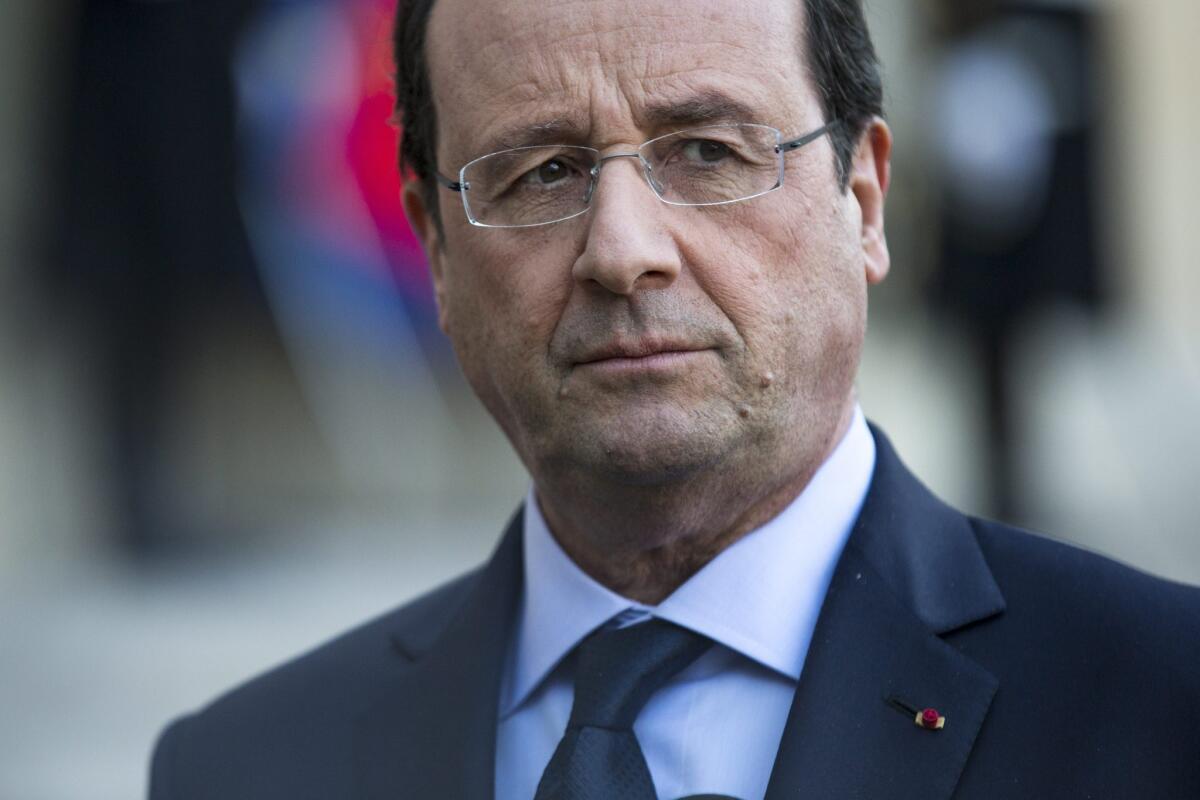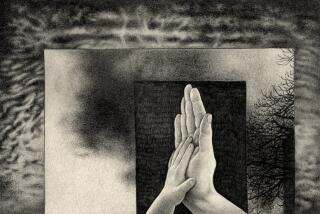France, a down-in-the-dumps nation

- Share via
PARIS — Not long ago, I attended a colloquium of French scientists and philosophers in Corsica, France, called “How to Think About the Future.” With few exceptions, the astrophysicists, economists, physicians and social theorists on hand offered dark visions of tomorrow. A new financial crisis, water and grain shortages, endless war, a general collapse of ecosystems — we were spared no catastrophic scenario.
A month earlier, I had been invited by the environmentalist think tank Breakthrough to San Francisco, where I reflected with a group of thinkers on the Schumpeterian economic idea of “creative destruction” and its application to energy production. My experience there was quite different: three days of vigorous and sometimes tense debates among advocates favoring, respectively, nuclear power, shale gas and renewable energy sources. Defenders of threatened species had their say too, but no one doubted in the slightest that we had a future, even if its contours remained unclear.
I recall an observation that Michael Schellenberger, Breakthrough’s president, made in the proceedings: “The United States’ greatest hope at present lies in shale gas and in the 11 million illegal immigrants who will soon become legal, 11 million brains that will stimulate and renew our country.”
Such a comment exhibited a hopefulness completely missing in Corsica — and hard to find in today’s France, which has outlawed even the exploration of possible reserves of natural and shale gas, and which sees every stranger on its soil as a potential enemy. France has become a defeatist nation.
A striking indicator of this attitude is the massive emigration that the country has witnessed over the last decade, with nearly 2 million French citizens choosing to leave their country and take their chances in Australia, Brazil, Canada, China, the United States and other locales. The last such collective exodus from France came during the French Revolution, when a large part of the aristocracy left to await (futilely) the king’s return. Today’s migration isn’t politically motivated, however; it’s economic.
This departing population consists disproportionately of young people — 70% of the migrants are under 40 — and advanced-degree holders, who do their studies in France but offer their skills elsewhere. The migrants, discouraged by the economy’s comparatively low salaries and persistently high unemployment — currently at 10.9% — have only grown in number since Socialist Francois Hollande became president.
The young and enterprising in France soon realize that elsewhere — in London, say — obstacles to success are fewer and opportunities greater. The British capital is now France’s sixth-largest city, with 200,000 to 400,000 emigres.
The exile rolls also include hundreds of thousands of French retirees, presumably well-off, who are spending at least part of their golden years in other countries. Tired of France’s high cost of living, they seek out more welcoming environments.
My beloved country, in other words, has been losing not only its dynamic and intelligent young people but also older people with some money. I’m not sure that this social model can work over the long term.
The protests that swept France in autumn 2010 reflected the country’s defeatist attitude too, though in a different way. The government of Hollande’s predecessor, Nicolas Sarkozy — hoping to put tottering public finances on somewhat firmer ground — sought to increase the average retirement age in France from 60 to 62.
This was an inadequate measure to deal with the magnitude of France’s massive deficit, especially compared with Germany’s fixing of retirement at 67, but, as was typical of the Sarkozy era, it unleashed a gigantic wave of unrest. The French confronted the surprising spectacle of high school students demanding pensions. Even before starting their working lives, the adolescent demonstrators were already thinking about ending them.
Gravely affected by the weak economy, these young people make up the avant-garde of what may as well be France’s largest contemporary party: the Party of Fear. For the French have become afraid of everything: the world, poverty, globalization, Islam, capitalism, global warming, natural catastrophes — and even, to borrow an American phrase, fear itself.
No longer a world leader, contemporary France has increasingly abandoned itself to self-denigration. The French don’t like themselves any longer — they’re one of the world’s most depressed populations, a huge consumer of psychotropic drugs and tranquilizers — and they don’t expect others to like them either. A country so unsure of itself, needless to say, is incapable of inspiring enthusiasm among the young.
Contemporary France lacks both the self-assured pride — without which nothing great can be accomplished — that has long characterized the United States and, more recently, China and India, and a curiosity regarding other cultures, the passion to learn from what is foreign, which is a sign of intelligence and reason.
France remains blessed by its extraordinary beauty, which draws 70 million tourists a year, and it can still claim successful multinational corporations, a well-educated youth, a capable military and geological wealth. So where does our strange weakness, at once economic and spiritual, come from?
It has two deeper explanations, I believe. First is a hatred of money, a dual legacy of Catholicism and republicanism. To understand the French stance toward money, one should return to the well-known Balzac phrase: “Behind every great fortune there is a great crime” — as if the thirst for material success sprang from a desire to deprive others or prostitute their dreams. French leaders left and right have denounced filthy lucre. “My only adversary, that of France itself, has never ceased to be money,” said Charles de Gaulle in a 1969 interview with Andre Malraux. Hollande, not to be outdone, declared during the 2012 election campaign that he had only “one adversary: international finance.”
The second explanation for the French malaise is a widespread conformism, which paradoxically stems in part from our revolutionary history. Because the French made a great revolution more than two centuries ago, they seem to believe that they’re excused from the need to renovate and adapt today.
One discordant note to France’s current defeatism is the nation’s fertility rate, among the highest in the Old World. We fight against our sense of gloom about the future, it seems, by repopulating our cradles. Here, we see the possibility of a fresh beginning, the chance that every generation has to look at the world anew. If it is not to be buried in its own mausoleum, a country must prove able to break with old habits and find renewal, and a growing population makes this easier to imagine.
If France is not to become Europe’s new sick man, alongside Greece and Spain, it must rise to the challenge of competing with its neighbors and the world’s emerging economic powers. Indeed, it must accept existence itself as a challenge and undertake the necessary changes. In an age of variable and fleeting patriotism, France must hold its children close but not expect them to show a limitless attachment. Perhaps the recent diaspora of the young and ambitious will one day be seen as the beginning of France’s salvation.
Pascal Bruckner is a French writer and philosopher whose latest book is “The Fanaticism of the Apocalypse.” His article was translated by Alexis Cornel and adapted from the Winter 2014 issue of City Journal.
More to Read
A cure for the common opinion
Get thought-provoking perspectives with our weekly newsletter.
You may occasionally receive promotional content from the Los Angeles Times.










